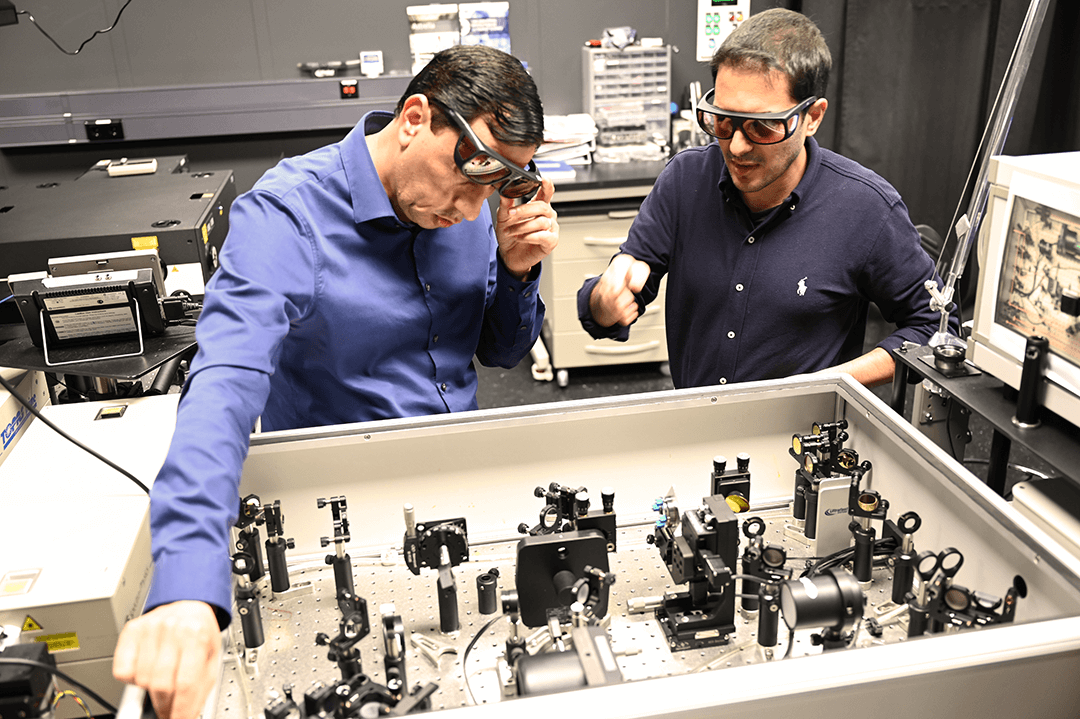Two KAUST professors awarded Kuwait Prize for work in condensed matter physics

KAUST professors Omar Mohammed (left) and Osman Bakr (right) in the femtosecond laserspectroscopy lab at KAUST. Photo: KAUST
Two scientists at King Abdullah University of Science and Technology (KAUST) have been awarded the Kuwait Prize 2021 in recognition of their outstanding research achievements in the area of physics.
Professors Osman Bakr and Omar Mohammed, who work closely together in the KAUST Physical Science and Engineering Division, were awarded the prize in the Condensed Matter Physics category for their ongoing studies into perovskite materials in solar energy applications and high-energy radiation sensors.
The Kuwait Prize is awarded annually by the Kuwait Foundation for the Advancement of Sciencesto the most distinguished scientific minds from the region, acknowledging outstanding contributions, with each award amounting to around $132,000 in prize funding.
"It was very pleasant surprise to learn we had won the prize," said Mohammed.
"It's a huge honor," Bakr added. "This is one of the biggest and most well-known prizes in the region, so, needless to say, I was happy to find out the news."
Laying the foundations for solar cell development
The professors' research carries importance for the development of a sustainable energy system the world can rely on in the future, especially regarding the role that solar will be able to play.
Bakr is a professor of materials science and engineering and vice provost for strategy at KAUST, with much of his work taking place in the Functional Nanomaterials Lab. Specifically, his research interests lie in the physics and chemistry of hybrid materials. The group he leads studies the synthesis and assembly of organic-inorganic hybrid materials and nanomaterials of novel optical and electronic properties.
His research has real-world implications for the development of solar cells and optoelectronic devices, especially around the fabrication of advanced materials that could be used to create them in the future. Likewise, the study of perovskite material applications in high-energy radiation sensors has the potential to transform the use of X-rays and other techniques vital to the medical diagnostics and security sectors.
"The variety of applications — and by that, I mean useful applications that can impact lots of people — is why I want to keep pursuing this research," Bakr said. "I am fascinated by the properties of perovskite materials, and over the past decade there has been great interest in how we can exploit these properties. They are extremely versatile."
Mohammed began studying chemistry at Assiut University in 1995 before obtaining his Ph.D. in physical chemistry at the Humboldt University of Berlin in 2006. Today, his research is geared towards developing a fundamental understanding of carrier dynamics in a variety of solar cell systems, which include semiconductor quantum dots, polymers and perovskite solar cells. At KAUST, he utilizes leading-edge nanotechnology, ultrafast laser spectroscopy and four-dimensional electron imaging to conduct his research.
"As an example, X-rays have massive potential," Mohammed said. "This technology is needed in so many applications, not just in medical but also security. Airports, rail stations, hotels … any venue where inspection needs to take place. If we can lower the cost of fabrication and provide better accuracy and resolution of imaging, the impact could be significant on our daily lives."
A thriving culture of science, technology and innovation
Since its founding in 1979, the Kuwait Prize competition has expanded into several annual categories, and a flood of applications are received each year from Arab researchers around the world.
"I was working with Professor Ahmed Zewail at Caltech (Nobel Prize in Chemistry, 1999, and a previous winner of the Kuwait Prize), who told me that in 15 years' time I should apply for it myself," Mohammed recalled. "He had confidence that one day I could win it, and I am delighted that he has been proven correct!"
"We're certainly in good company," Bakr said. "Previous winners have come from around the world and have included Nobel Laureate winners. I am humbled to have been chosen as a winner."
Looking ahead to the future, being recognized with the Kuwait Prize has added extra motivation for both Bakr and Mohammed to continue pushing boundaries with their research. While the recognition is welcomed, their work is not driven by winning accolades. More importantly, the Kuwait Prize shows that their contributions are making a difference.
"We will continue our work around new materials discovery, but I am also greatly enthused to take our perovskite research further and push its applications," Bakr said. "There are exciting times ahead."
Related links
- Super scintillators enable X-ray detection at an ultralow level
- A crystal clear step closer to commercial solar cells
- Royal Society of Chemistry elects KAUST professors to its ranks

